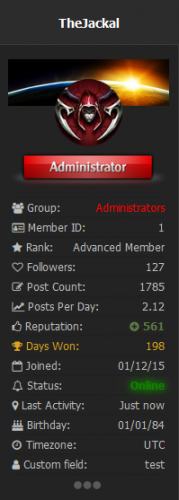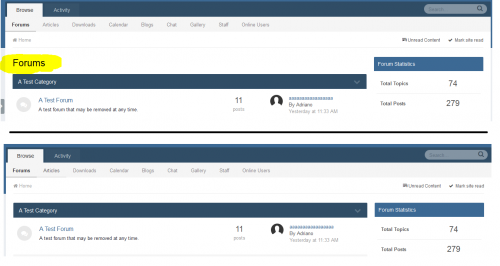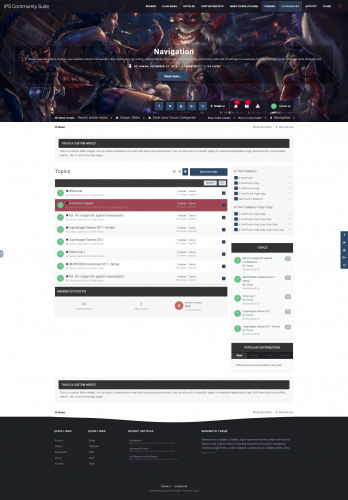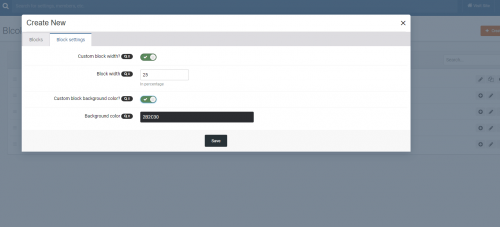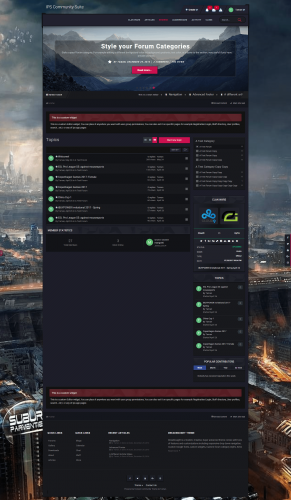About This File
With group collaboration, members of your community are able to form their own groups, ranks, memberships and micro communities within the fold of your whole community.
Any group can collaborate to create, maintain, and manage its own content based on what you allow as the site administrator. Out of the box, you can allow groups to manage their own forums, galleries, calendars, blogs, downloads, databases, and more. You control all the permissions and limits.
Features Overview
- Create any number of categories and subcategories for groups to operate in, and set permissions and limits for groups on a per category basis.
- Move groups in and out of different categories at any time.
- Customize what groups are called on a per category basis.
- Set permissions for each category to determine which content types the group can use, how much they can use, what moderation permissions they are allowed within their group, who can view, create, and join groups in the category and more.
- Group leaders can create their own roles within the group, assign any of the permissions they’ve been allowed to those roles, and assign roles to other group members.
- Group leaders can set permissions on the content within their group based on the roles that they have created. All permissions for the content type are available.
- Group leaders can decide how they want to manage memberships to their group. Groups can be set to automatically accept new members, queue members for approval, be invitation only, or closed altogether.
- You can configure how many members a group can have total on a per category basis.
- You can configure how many groups an individual member can create or be a member in on a per category basis.
- You can configure how many groups members can own and be a part of on a sitewide level on a per member group basis.
- Group members have their own member titles, ranks, and post counts within each group which can be customized by group leaders.
- You can decide if post counts are added to the whole site post count or kept separate for the group on a per category basis.
- You can create “group models” in each category which act as a base layout and content structure for new groups.
- Group models can be used automatically, or you can give new group owners the choice as to which model they want to use.
Features Added in 1.1
- Added built in import utility for rsyvarth social groups 2.x
- Content feeds (widgets, etc) on collab pages will now only show content from that collab
- Content feeds on non-collab pages will only show non-collab content and content the user has access to see in collabs
- Added new private listing mode for collab categories
- Added ability to move/copy non-collab content into collabs
- Added ability to extract content from collabs into main site
- Added featured/latest collabs widgets
- Added autofill of member name when inviting to collab
- Added support for disabling "view other members topics" inside collabs
- Collab title in the group header now links to the collab homepage
- Collabs now inherit join mode of models
- Collabs now inherit default member title of models
- Collab stats can be added to collab header via Automation Rules
- Added collab menu manager
- Collabs and collab categories can now be shown on forums index
- New widget to show collabs for the currently logged in member
Features Added in 1.2
- Performance options are now available for unread content calculation inside of collaborations
- Events can now be created in collabs directly from the calendar
- Import from social groups has improved accuracy
-
Group Collaboration Badges ( by wohali )
-
What's New in Version 1.3.16 See changelog
Released January 3
Maintenance
- added a couple missing language strings
- fixed bug with content not showing to members in a private collab
- fixed an uncaught exception when check for forums linked to collab categories
- fixed an error caused if a content type was mising a language string on the collab management page




